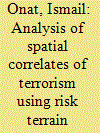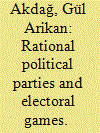| Srl | Item |
| 1 |
ID:
166663


|
|
|
|
|
| Summary/Abstract |
The purpose of this study is to identify correlates of terrorism in space. It examines whether places with terrorist incidents show similar patterns with respect to the physical features across landscape, and tests the spatial influence of various features of environment on the incidence of terrorism. Drawing on the locations of violent terrorist offenses committed between 2008 and 2012, the study in Istanbul applies the Risk Terrain Modeling framework to terrorism. It uses data on police incidents and infrastructure (e.g., government buildings or parks). The analysis employs GIS techniques and an event count model, and combines all risky layers in a composite map to understand where the risk is higher. The study suggests a concentration of 1153 violent terrorist incidents relative to key physical factors by identifying seventeen potential risk factors, eight of which were significantly correlated in the model. Regardless of terrorists’ intent, the significantly associated establishments increase the risk in the surrounding areas where these features are located. The coexistence of leisure places such as bakeries, religious facilities, or eateries results in higher risks. While the environmental backcloth may constitute a risk for terrorism, its components may also help forecast the locations of terrorist incidents in the future.
|
|
|
|
|
|
|
|
|
|
|
|
|
|
|
|
| 2 |
ID:
181775


|
|
|
|
|
| Summary/Abstract |
Grid resilience and reliability are pivotal in the transition to low and zero carbon energy systems. Tree-trimming operations (TTOs) have become a pivotal tool for increasing the resilience power grids, especially in highly forested regions. Building on recent literature, we aim at assessing the temporal and spatial extents of the benefits that TTOs produce on the grid from three perspectives: the frequency, extent, and duration of outages. We use a unique dataset provided by Eversource Energy, New England's largest utility company, with outage events from 2009 to 2015. We employ spatial econometrics to investigate both the legacy and spatial extent of TTOs. Our results show TTOs benefits occur for all three metrics for at least 4 years, and benefits spillover to up to 2 km throughout the treated areas, with significant spatial spillovers across the state greater than direct effects. Implications lead to supporting TTOs as part of the hardening policies for utility companies, especially as home-based activities increase in importance in a post-COVID19 world.
|
|
|
|
|
|
|
|
|
|
|
|
|
|
|
|
| 3 |
ID:
145645


|
|
|
|
|
| Summary/Abstract |
Based on spatial modeling, this study introduces the Kurdish Opening policy of the AKP to resolve the Kurdish problem in Turkey as a rational strategy to increase its electoral support. On one hand, through the analysis of the effective numbers of parties, margins of victory in the Kurdish populated region and provinces it shows that the AKP and the pro-Kurdish parties are the main competitors among Kurdish voters, yet the competition the two parties face is not uniform across the provinces. On the other hand, shifts in Islamist vote and volatility rates indicate the presence of a large amount of religiously oriented ethnic voters who are sensitive to positional change especially in the provinces where the AKP is overrepresented in the parliament. More generally, the study confirms that the AKP's move on the Kurdish issue should be evaluated as a rational strategy that increases the number of potential swing voters for the party.
|
|
|
|
|
|
|
|
|
|
|
|
|
|
|
|